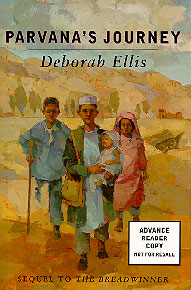| ________________
CM . . .
. Volume IX Number 3. . . . October 4, 2002
It is easy to ignore or forget about the plight of civilians during wartime as the media highlight instead the roles played by opposing militaries. In Parvana's Journey, a sequel to the award winning The Breadwinner, Deborah Ellis shows us the horrific situations that war can bring for all, but particularly for children. As the story opens, 13-year-old Parvana, disguised as a boy, is burying her father who has succumbed to illness. She and her father had set out into war torn Afghanistan to search for her mother and three other siblings. Fleeing from the Taliban who want to conscript her, Parvana walks from village to village, sometimes begging and asking for work, always hungry. In one bombed out village, she finds a baby boy she names Hassan, and in a cave she discovers a crippled young boy, Arif, who has lost a leg. Trapped in a mine field, they are rescued by eight year old Leila who is alone trying to look after her old grandmother. Bombs force them to be on the move again until finally they arrive in a refugee camp where Parvana finds her mother and sisters but looks into the face of death again when Leila runs into a mine field to gather food parcels. This is a gripping, horrifying novel that will leave readers of all ages asking searching questions about the nature of war and its causes. Parvana and her adopted brothers and sister have no understanding of why they are suffering. Parvana has memories of happier times when adults were in charge, they were loved and safe, and food was plentiful. Parvana's father, a middle class teacher who had been to England to be educated, had taught her to read and write and do arithmetic before he was arrested. Arif's parents had died, and he had run away from an uncle who beat him. Leila waits patiently for her mother who has gone away to search for her husband and her son. Parvana, as the oldest child, takes charge, but, as she writes daily to her friend Shauzia, the reader sees her childish longings and incomplete understanding. Parvana is a fascinating character whose inner strength and determination propel her and the other children to safety. Touchy, irritable Arif turns out to have talents that give Parvana respite as he carries Hassan on his back, patches mud walls and constructs mouse-proof containers. Leila gradually lets herself become Parvana's "sister" as they daily watch the landscape for their mothers' return. The ominous, anonymous nature of war dominates the bleak setting of Afghanistan as planes and tanks rumble along in the background while the children scrabble for existence. Ellis slips the details of Afghani life so neatly into the plot. She uses Parvana's daily missals to Shauzia, and moving, amusing and poignant dialogue among the children to set the scene and move the story along. Like all good novels, this one has a gripping plot that keeps the reader turning pages in order to find out what happens to characters who command our sympathy and touch our hearts. An adult reader might legitimately wonder if the subject of this excellent book is suitable for young people. However, Parvana's Journey will, like The Devil's Arithmetic by Jane Yolen and Lord of the Nutcracker Men by Iain Lawrence, both inform children and fill their hearts with compassion. The author's royalties from the sale of Parvana's Journey (and The Breadwinner) will go to an organization in Afghanistan that helps women. Purchasing a copy, therefore, is in itself a political act that even young adults will clearly understand. Both books should be in every school library and would make great gifts that will inspire students to learn more about the suffering of other children around the world. This is the story of a child who survives war through determination, grit and good luck. The story's ending calls for a sequel. Every reader will clamor to know what happens to Parvana and her family. Highly Recommended. Joan Marshall is the teacher-librarian at Fort Richmond Collegiate in Winnipeg, MB.
To comment on this
title or this review, send mail to cm@umanitoba.ca.
Copyright © the Manitoba Library Association. Reproduction for personal
use is permitted only if this copyright notice is maintained. Any other
reproduction is prohibited without permission.
Published by
NEXT REVIEW |TABLE OF CONTENTS FOR THIS ISSUE
-October 4, 2002.
AUTHORS
| TITLES | MEDIA REVIEWS
| PROFILES
| BACK ISSUES
| SEARCH | CMARCHIVE
| HOME
|
